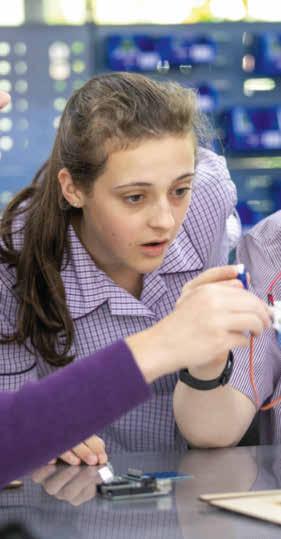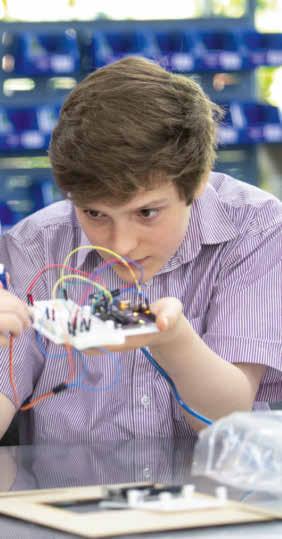
5 minute read
ELTHAM College
Principal Simon Le Plastrier
Committed to ensuring that young people see life as a chance for unlimited learning, Simon Le Plastrier is a highly experienced and enthusiastic educator who has worked in coeducational, independent education for more than 40 years.
ELTHAM College – Research Campus
1660 Main Road, Research VIC 3095
ELTHAM College – City Campus
Level 2, 398 Lonsdale Street, Melbourne VIC 3000
At ELTHAM College, we believe that school is a daring adventure where children learn to think for themselves in preparation for a future of exciting possibilities. Our exceptional teachers and small classes enable students to be treated as individuals and to be given individual attention. We focus on the skills and attributes that make each of them unique.
At ELTHAM we are committed to creating spaces and opportunities for collaborative learning. Our young people are encouraged to see life as a chance for unlimited learning, while we have the privilege of helping to “grow the hearts and minds” of the next generation. Our curriculum integrates literacy and numeracy into a wide range of experiences, ensuring that learning is meaningful and constructive.
We’re constantly adapting to the changing needs of young people and their world. We support them on their learning journey to unlock their talents through one of Victoria’s broadest curriculums. Most importantly, our teachers guide each young person to become empowered with the selfconfidence and independence to manage all aspects of their future lives.
THE BASICS
Enquiries
+61 3 9437 1421 elthamcollege.vic.edu.au enrolments@elthamcollege. vic.edu.au
Years
ELC – Year 12
Denomination
Non-denominational
Gender
Co-educational
Fees
Please see our website
Boarding \ No
Scholarships \ Yes
ATAR \ Average 79*
SCIENCE
Students are encouraged to explore, innovate and collaborate. Academic skills are developed within engaging modules that specifically promote the value of STEAM (Science Technology Engineering Art Mathematics) in education.
HOSPITALITY
ELTHAM owns and operates a Hospitality Training Centre and fully functional cafe and restaurant called Swipers Gully. The centre allows Year 10, 11 and 12 students to participate in a number of VET and VCE options.
* Results are provided by the school, Domain does not warrant their accuracy
CITY CAMPUS
Our City Campus provides the opportunity for Year 9 students to gain significant personal and academic development. Specifically designed to respond to the learning and social needs of young people navigating their way to adulthood.
RESILIENCE
Resilience is built through real experiences and by being out of our comfort zone. With care and empathy our community was supported as we all transitioned through different learning environments throughout 2020.
TECHNOLOGY AND THE CLASSROOM
STEM subjects provide opportunities for critical thinking and problem solving.
BY PETER HANLON
NAVIGATING THE REAL WORLD
Micah Wilkins doesn’t remember the acronym STEM being used in his school days, which ended in the early 2000s, around the time it was popularised. Now, as head of digital learning and innovation at Camberwell Girls Grammar School, the catch-all for science, technology, engineering, and mathematics is part of his everyday world.
Yet for all of the advances made in how science and technology is taught in the classroom, the principle behind STEM learning remains the same as when Wilkins took on an elective called electronics in year 9 and used a soldering iron, among other tools, to construct a small recording device. (He laughs, recalling that his never actually worked, while another classmate’s exploded.)
“The thinking then is not dissimilar to what we’re trying to get our students to do now,” he says. “We’re working with real-world problems; we’re using tools of the trade; we are asking big questions and being curious with our learning.
Dean Pearman, head of digital learning and practice at Wesley College, agrees that for all of the wonderful learning environments that school Makerspaces and STEM laboratories now offer students, to see them as purely the domain of the technologically minded is to miss a crucial part of the picture.
At Wesley, digital technology studies sit under the holistic-approach-tolearning umbrella that envelops every class and subject, from prep to year 12. It recognises the importance of technology in the life of the community and is used not simply to design and build amazing things but to embed the necessary skills in cyber safety and in digital privacy and wellbeing that will help young people thrive after walking out through the school gate for the last time.

STEM and what it means,” Pearman says. “When you start to suggest that you have to be innately good at technology to be involved in STEM spaces and labs, you’re missing a whole range of other avenues in which students can work in that very same space.
At CGGS, a fleet of robots including NAO, DASH, EV3s and SPHERO help students learn coding, which Wilkins simplifies as “the language that sits behind all the web interfaces we see, all the apps we use and many of the games we play”. Yet behind the otherworldliness of the “bots” are much broader learning opportunities.
“Through robotics we ask, ‘How are we developing those important transferable skills such as critical thinking and creativity? How are we developing teamwork and organisation?’
“Doing STEM for us is, yes, you will learn some of those techy skills that are important. But underpinning that is a way of seeing and navigating the world that is more important,” says Wilkins.
“Many schools can talk about their laser cutters and 3D printers, their NAO bots and SPHEROs, but on the ground, what does it actually look like, and what does it mean for learning?
At Wesley, the remote learning experience of 2020 underscored for Pearman that technology at its core is a building material, and that young people will find meaningful ways to use it no matter what hurdles appear in their path. The broader benefits make the STEM experience all the more compelling.
“When you have been through our Makerspace or STEM lab during your educational journey at Wesley‚ to solve problems and be exposed to a designthinking process will set our students up for when they go into the workforce,” Pearman says.
important.’
MICAH WILKINS








